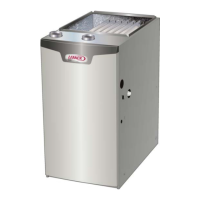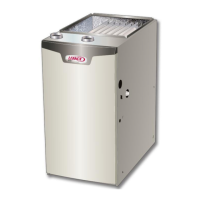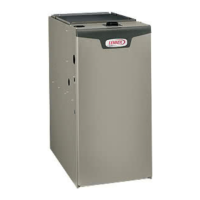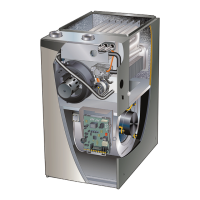Page 6
Safety Precautions
If you discover any of the following, shut down your
unit, and contact a Lennox dealer for an inspection by
a licensed professional service technician (or equiva
lent).
D If you repeatedly hear any new or unfamiliar sounds
while your unit is operating, there may be a problem. For
example, poorly performing burners can produce unfa
miliar noises.
D If you smell any unusual odors, your unit may be operat
ing improperly. For example, units can give off unfamil
iar odors if components are required to operate in ab
normal conditions.
D Look for visible signs of a malfunctioning unit. Examples
include unusual amounts of condensate on windows in
side your house, visibly burnt components or unusual
dirt or rust accumulations on the vent pipe or in the unit.
D If you experience headache, nausea, fatigue, or dizzi
ness, the cause could be exposure to carbon monoxide
gas. This is often misdiagnosed as the flu because
symptoms are similar. If you suffer from flu-like symp
toms that are exaggerated at home, but seem to sub
side while you are away from the house, exposure to
carbon monoxide could be the cause.
WARNING
Do not use this furnace if any part has been under
water. A flood-damaged furnace is extremely dan
gerous. Attempts to use the furnace can result in fire
or explosion. Immediately call a licensed pro
fessional service technician (or equivalent) to in
spect the furnace and to replace all gas controls,
control system parts, and electrical parts that have
been wet or to replace the furnace, if deemed neces
sary.
Your vigilance may pay off in early detection of a problem
before either personal injury or property damage occurs.
Do not hesitate to contact a qualified service technician as
an investment in your well being.
Planned Service
Annual Furnace Maintenance
At the beginning of each heating season, and to comply
with the Lennox Limited Warranty, your system should
be checked as follows by a licensed professional service
technician (or equivalent).
1- Check wiring for loose connections, voltage at indoor
unit and amperage of indoor motor
.
2- Check the condition of the belt and shaft bearings if ap
plicable.
3- Inspect all gas pipe and connections for leaks
.
4- Check the cleanliness of filters and change if necessary
(monthly).
5 Check the condition and cleanliness of burners and
heat exchanger and clean if necessary.
6 Check the cleanliness of blower assembly and clean
the housing, blower wheel and blower motor if neces
sary
.
7- Inspect the condensate drain and trap for leaks and
cracks. The drain and trap must also be cleaned and the
trap must be primed with water. Inspect the rubber
hoses connected to the pressure switches for cracks or
loose connections, replace as necessary. Remove the
rubber hoses from the cold end header box and inspect
for any blockage, clean as needed. If strainers are in
stalled in the hoses remember to remove and clean be
fore reinstalling the hoses.
8- Evaluate the heat exchanger integrity by inspecting the
heat exchanger per the AHRI heat exchanger inspec
tion procedure. This procedure can be viewed at
www.ahrinet.org
9- Ensure sufficient combustion air is available to the fur
nace. Fresh air grilles and louvers (on the unit and in the
room where the furnace is installed) must be properly
sized, open and unobstructed to provide combustion
air
.
10 Inspect the furnace intake and exhaust pipes to make
sure they are in place, structurally sound, without holes,
blockage or leakage and the exhaust pipe is sloped to
ward the furnace. Inspect terminations to ensure they
are free of obstructions and are structurally sound.
Inspect the furnace return air duct connection to ensure
the duct is sealed to the furnace. Check for air leaks on
supply and return ducts and seal where necessary
.
NOTE - After any heavy snow, ice or frozen fog event the
furnace vent pipes may become restricted. Always check
the vent system and remove any snow or ice that may be
obstructing the plastic intake or exhaust pipes.
11 Inspect the furnace return air duct connection to ensure
the duct is sealed to the furnace. Check for air leaks on
supply and return ducts and seal where necessary
.
12 Check the condition of the furnace cabinet insulation
and repair if necessary.
13 Perform a complete combustion analysis during the fur
nace inspection to ensure proper combustion and oper
ation. Consult Service Literature for proper combustion
values.
14 Verify operation of CO detectors and replace batteries
as required.

